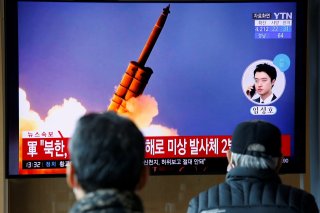North Korea: What Should a Reelected Trump or President Biden Do Next?
What can a reelected Trump or a newly elected Biden do to overcome North Korea’s resistance to meaningful negotiations? North Korea is hurting: its economy is stagnant and it is having trouble feeding even its elites because of the UN/U.S. sanctions designed to pressure North Korean toward denuclearization. A combined carrot and stick approach may help overcome some of North Korea’s reluctance to negotiate the future of its nuclear weapons program.
Editor's Note: As Election Day rapidly approaches, and with it a potential change of presidential administration, the Center for the National Interest’s Korean Studies team decided to ask dozens of the world’s top experts a simple question: If Joe Biden wins come November, what do you expect his North Korea policy to look like? The below piece is an answer to that question. Please click here to see even more perspectives on this important topic.
In 2016 and 2017, North Korea carried out a series of nuclear weapons and ballistic missile test provocations that raised regional anxiety about the possibility of war. President Trump’s “maximum pressure” campaign added to this anxiety. In early-2018, North Korean leader Kim Jong-un reduced this anxiety by offering to negotiate the dismantlement of his nuclear weapon program and promising to forgo all ballistic missile and nuclear weapon tests during the negotiation process.
President Trump has now had three meetings with Kim Jong-un, substantially reducing fears of war, but accomplishing no denuclearization. Indeed, quite the opposite: North Korea has reportedly ramped up its nuclear weapon production and has tested several dozen ballistic missiles. Most estimates suggest that North Korea now has dozens of nuclear weapons, many of which can be delivered by ballistic missiles, with the potential to kill millions of people and otherwise cause immense damage. North Korea also appears anxious to use leverage from its nuclear weapons to strengthen its regime and coerce its neighbors.
The complexity of the issues associated with North Korean denuclearization has limited its visibility in the midst of the coronavirus pandemic and the U.S. presidential election, but after November the elected President will need to face this threat. The lack of war might no longer be accepted as an adequate substitute for North Korean denuclearization.
What can a reelected Trump or a newly elected Biden do to overcome North Korea’s resistance to meaningful negotiations? North Korea is hurting: its economy is stagnant and it is having trouble feeding even its elites because of the UN/U.S. sanctions designed to pressure North Korean toward denuclearization. A combined carrot and stick approach may help overcome some of North Korea’s reluctance to negotiate the future of its nuclear weapons program.
In terms of carrots, the UN/U.S. could be more explicit about the conditional nature of the existing sanctions. For example, if North Korea were to freeze its nuclear weapons production, would North Korea be able to export a significant amount of coal and apparel to other countries? While the U.S. could negotiate such conditions with North Korea, it may be effective to simply announce what the United States is prepared to offer, recognizing that North Korea will still likely want to negotiate on the margin.
The United States could take a similar approach with the “end of war” agreement that North Korea has so much wanted. Would a freeze of the North Korean nuclear weapon production also be required for such an agreement, along with a North Korean commitment to end its hostility toward the United States as reflected in its internal indoctrinations program that portrays the United States as the eternal enemy of the North Korean people?
The United States could also seek to improve mutual understanding by inviting a senior North Korean leader (perhaps Kim Yo-jong?) to spend a week or two in the United States. That leader could learn about why the United States is so concerned about North Korean nuclear weapons and about what the United States is willing to do to reduce the threat.
In terms of sticks, the United States could threaten to increase the severity of the sanctions against North Korea. This could be done in part by using U.S. warships in the northern part of the Yellow Sea to interdict North Korean ships participating in the ship-to-ship transfers. Such an action would admittedly not make China happy, but the U.S. is also certainly not happy about the growing North Korean nuclear weapon threat.
While these efforts could be coordinated with U.S. regional allies, the United States could put proposals on the table to publicly demonstrate that it is attempting to reach a compromise with North Korea. At the same time, Washington may wish to carefully weigh the consequences of such incentives and should be wary that any offer it makes – explicitly or obliquely – may carry the risk of North Korea pocketing concessions without having made any corresponding steps toward the reduction of its nuclear threat and conventional military capabilities.
Bruce Bennett is a senior defense analyst at the nonprofit, nonpartisan RAND Corporation and a professor at the Pardee RAND Graduate School.
Soo Kim is a policy analyst at RAND.
Image: Reuters.

